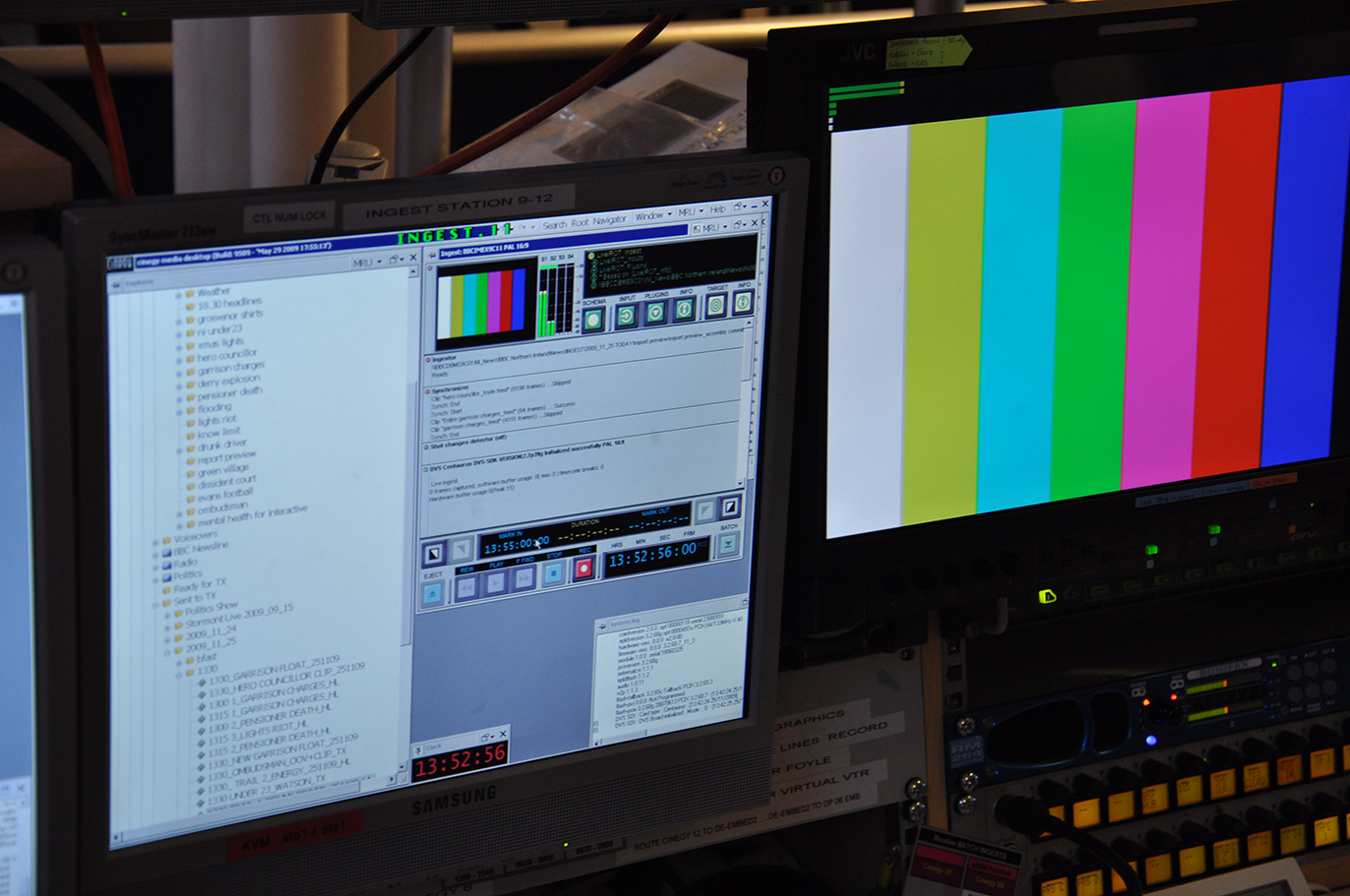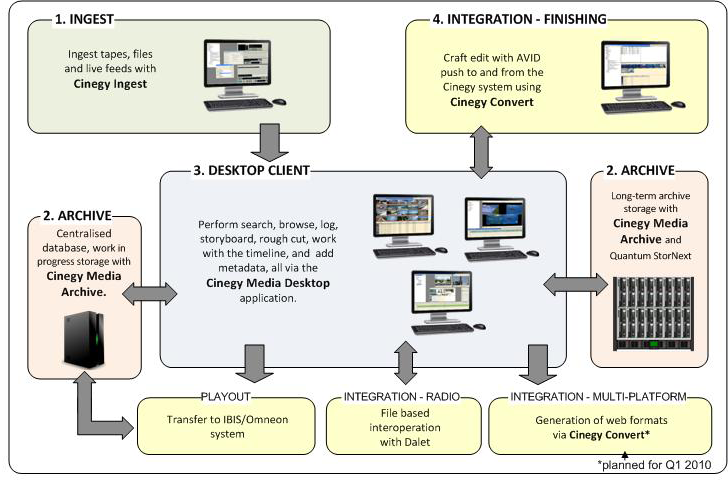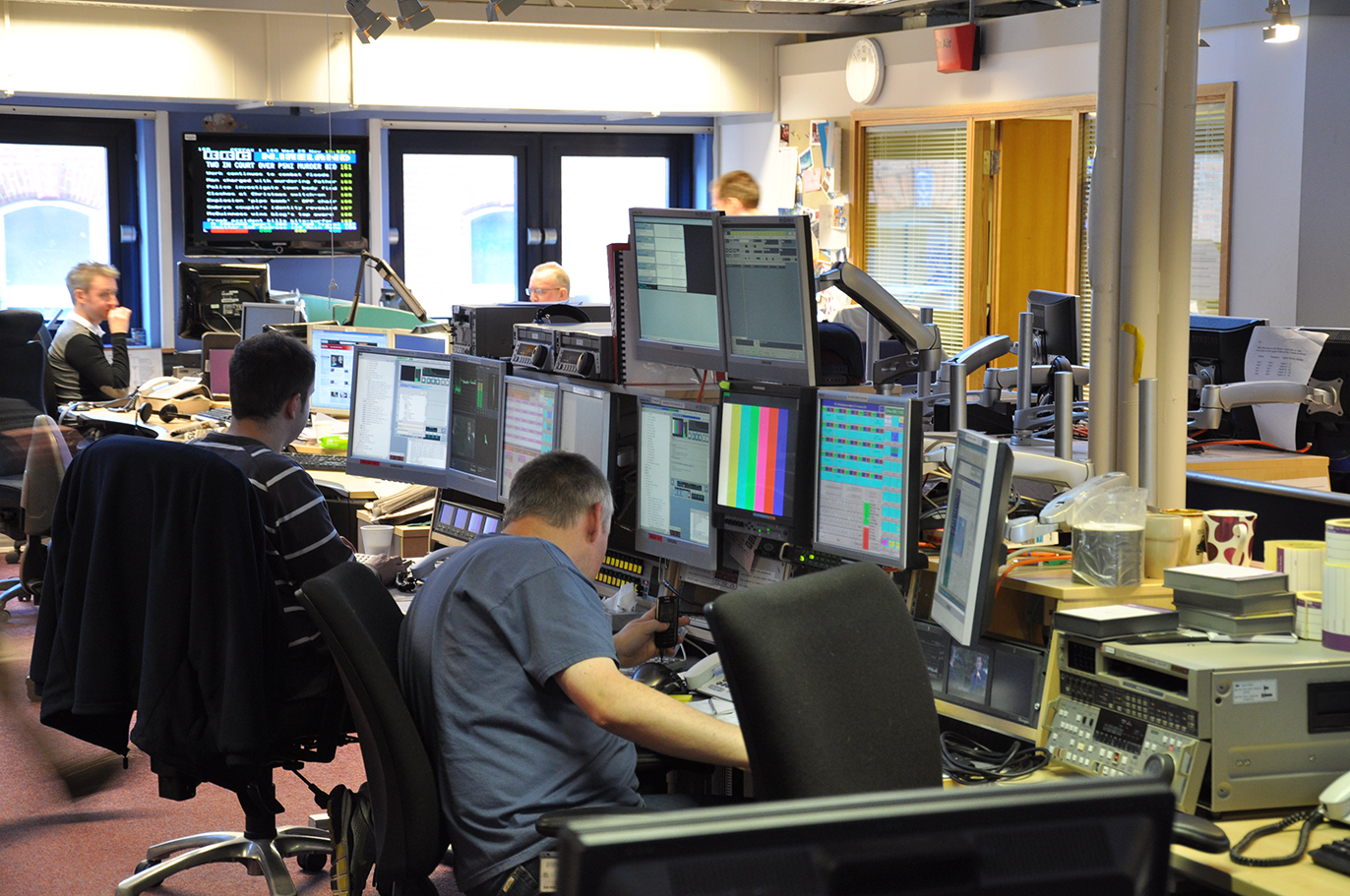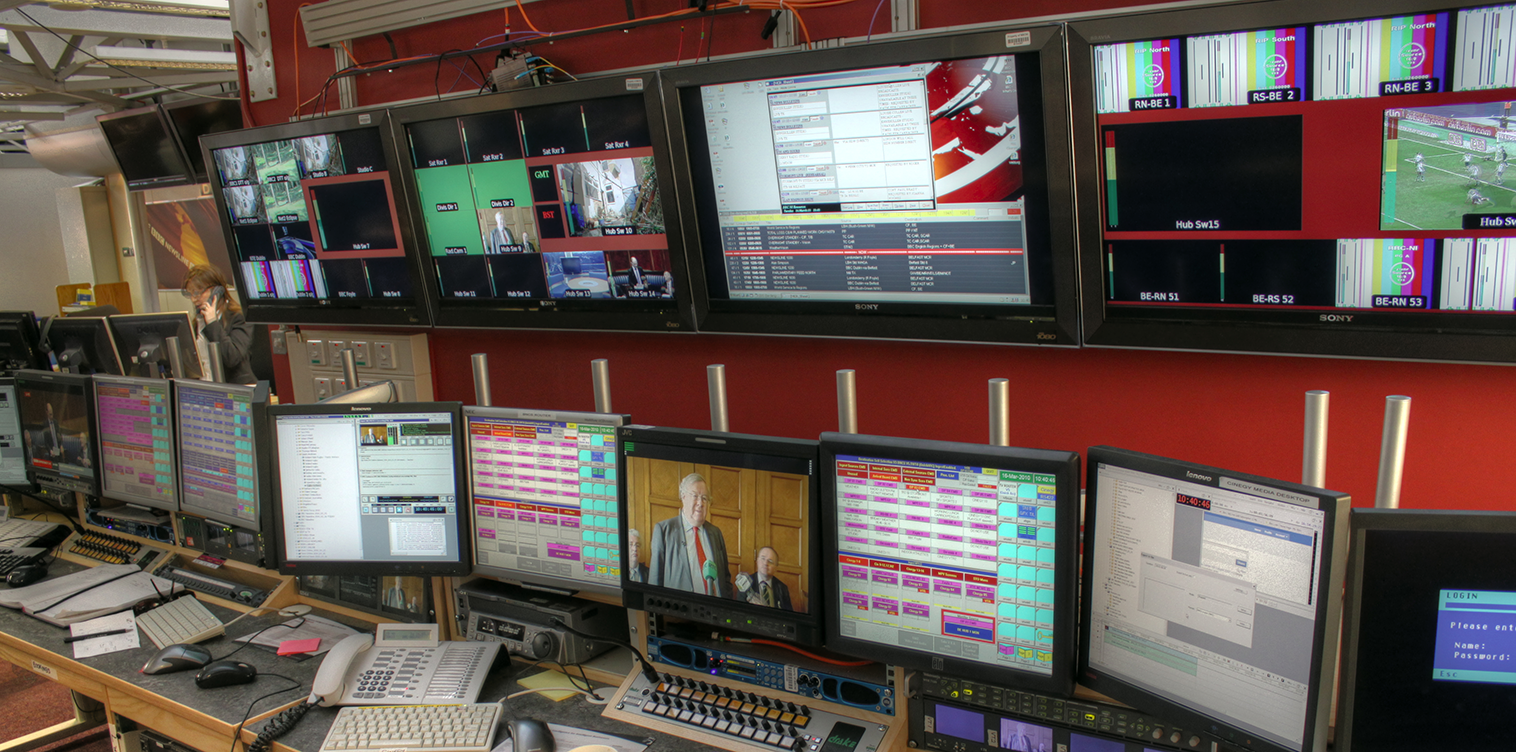Featured Projects
BBC Belfast and Cinegy News, Collaboration and Production for the Digital Northern Ireland Initiative
In the heart of Belfast, County Antrim, sits Broadcasting House, home to BBC Northern Ireland, the primary public service broadcaster providing television, radio, online and interactive television content to the Northern Ireland region. BBC NI is part of the British Broadcasting Corporation (BBC), and one of three such national regions, along with BBC Scotland and BBC Wales.
BBC Northern Ireland broadcasts two television channels from Broadcasting House, BBC One Northern Ireland and BBC Two Northern Ireland. The channels are mostly identical to the national BBC One and BBC Two broadcast from London, with the addition of regional programming and local announcers. The main signal is distributed from London to Belfast via dedicated lines where live continuity is managed by a team of regional announcers who double up as playout directors, inserting local programmes and content.
With a history of social and political turmoil, the accessibility of regional news and current affairs has always been paramount to the people of Northern Ireland. The BBC Northern Ireland regional news service, BBC Newsline, provides lunchtime, evening and late night bulletins. They offer several political programmes, such as, Spotlight and Let’s Talk, as well as local arts programmes and weekend chat shows. The Belfast facility produces a total of 11 daily regional news programmes as well as covering any special events in the region.
In addition to local programming focusing solely on a Northern Irish audience, the Belfast facility also features a large production unit that generates content that is broadcast on the BBC’s channels across the UK. This includes documentaries, drama and comedy programmes and other original content. In addition to the more traditional television and radio programmes, BBC Northern Ireland also has on increasing presence on the Web.
 |
“The interaction between the journalists and the technical people has been quite good. It used to be ‘them and us,’ whereas now, we’re working together as a team. It’s worked really well.” Archie Canning, Technical Lead (Digital NI), BBC Northern Ireland |
A Need for Change
While the news team at BBC Northern Ireland has a reputation for cutting edge journalism and original programming, they had been relying on aging technology. The newsroom was working on obsolete equipment which was passed its serviceable lifetime and the old tape-to-tape workflows required more effort and expensive equipment than modern software-based technology required.
Problems and shortcomings in the pre-existing production workflow were becoming increasingly apparent, unsustainable and expensive. The lack of a centralised media archive led to missing tapes and data, delays in digitisation particularly for multi-camera shoots, problems with multiple tape formats, inconsistencies in logging, as well as media security issues. The inability to browse and search the archive often led to a duplication of acquisition and research. Production bottlenecks arose frequently, especially as producers and journalists competed for time in a limited number of craft edit suites.
Additionally, BBC Northern Ireland faced delivery requirements that were increasingly multi-media and multi-platform. It also had a growing need to provide news content to bbc.co.uk ahead of, or simultaneously with its multi-platform television output. Such requirements were difficult to fulfill through the existing linear workflow. Producers found the production of content for online distribution particularly troublesome and awkward.
BBC Northern Ireland also faced a generalised need to reduce costs while maintaining or extending the quality and quantity of its production output.
The Solution
BBC Northern Ireland elected to resolve its dilemma by transitioning to a file-based production environment with a centralised digital asset management system, based on Cinegy Workflow. Cinegy software offered an ideal solution to the multiple issues BBC Northern Ireland faced.
Cinegy Workflow is an open platform system consisting of a suite of tools, applications and open APIs encompassing the complete broadcast production chain from ingest through to playout modules. Principal components installed at BBC Northern Ireland include Cinegy Ingest, for realtime, uncompressed HD-SDI encoding; Cinegy Archive, a server-based, centralised digital asset management system, and the Cinegy Desktop NLE, deployed on client workstations for managing ingest, logging, browsing, editing and other operations. The BBC Northern Ireland installation also includes Cinegy Convert for automated transcoding to enable integration with Avid and FCP.

This Cinegy solution was selected for its ability to provide the following:
- Flexibility and scalability allowing adaptation to productions of varying size, scope and delivery requirements.
- Improvement in production efficiency while reducing costs and without dictating a particular workflow
- Integration with existing processes and technology thus easing migration while enabling the possibility for third-party components to be updated and replaced as time and budget allow
- A pathway for future growth in terms of size and functionality, and to meet evolving content delivery needs
- Seamless integration with BBC on an enterprise wide basis
- A solution that supports open standards and formats
All Cinegy applications are designed to run on non-proprietary hardware, a key factor in both the speed of the implementation, which was less than six months, and its cost.
“One of the big benefits of Cinegy is that it does not require specialized hardware,” explains Cinegy Product Manager, Lewis Kirkaldie. “For BBC Northern Ireland, the majority of the hardware involved a purchase of servers from HP. That not only kept down costs, it made the implementation easier, very much like a standard IT enterprise project with technology that was quite familiar to the BBC’s staff.”

1. INGEST – Each of the 16 ingest stations has positions for one to two operators. In order to meet the needs of a busy newsroom environment, logging requirements at ingest are relatively minimal – programme name, date, subject, genre, director, etc. which can be amended or added to during subsequent stages of production. Ingest stations are also capable of recording back to tape, to fulfill needs for such purposes as transcriptions and music composition. The ingest machines are capable of generating video in multiple formats concurrently to satisfy complex delivery requirements as well as for use in the distributed work environment where users have varying format and resolution needs. Ingest is entirely Cinegy based.
A linear editing system was retained so that news footage, arriving too late to go through the normal ingest process, could be edited in a conventional manner and immediately prepared for air. That system, however, is expected to be phased out over the next year when a file-based camera acquisition system is put in place.
2. ARCHIVE – Cinegy Archive facilitates a collaborative workflow for both newsroom and production activities by providing real-time access to ingested media to client workstations. As there is no local storage of media assets, users logging into any client station are presented with the same work environment. Changes made by one user can be viewed by other users in real-time. Similarly, changes made to metadata are immediately propagated to other clients.
3. DESKTOP CLIENT – Cinegy Desktop is currently installed on more than 100 desktop systems, with over 300 users, with this number continuing to expand. The desktop client is used by journalists in preparing news and sports segments, and by loggers, producers, editors and others involved in the creation of long-form content. The system interface is intuitive and includes relatively robust editing tools allowing journalists to do much of the work of preparing stories for broadcasts at their own desks.
4. INTEGRATION – BBC Northern Ireland’s existing Avid editing systems have been seamlessly integrated using Cinegy Convert. Integration with the 14 Avid Media Composer editing suites has been achieved with a transfer speed of five times faster than real-time without transcoding. Completed projects are re-ingested to the Cinegy database as rendered flat files. Existing Avid DV Express machines are currently being used as standalones, but are expected to be decommissioned and replaced by Cinegy Desktop.
BBC Northern Ireland continues to rely on its pre-existing playout solutions which have been integrated with the Cinegy Workflow. Graphics systems are not directly integrated with Cinegy Workflow. Animations and other elements are ingested into Cinegy via SDI. The new workflow also enables the exchange of material between Cinegy and other third party solutions used for radio production as well as playout.
All this file based workflow technology represented a sharp departure from the way television was formerly produced at BBC Northern Ireland. While the engineers spent considerable time in mapping out the production workflow, they applied even more effort to assessing how the new technology would impact the people using it.
“Cinegy Workflow represents a fundamental change in the way people do their jobs—from where they go to get tapes loaded to which desks they sit at to do which jobs,” explains Kirkaldie. “The engineers had a lot of issues to sort through to change from the old style of working to the new.”

The Impact and the Results
Using the new system
An integral stage in the transition was preparing the staff at BBC NI for their new system. This involved training for the Cinegy tools, but also a significant focus of the meetings and training sessions was devoted to discussions about Cinegy’s impact on the work environment. In preparation for the change to the new technology, staff from the Belfast facility went through a training program with BBC Academy. Learning the basics of Cinegy is relatively simple as the timeline and other tools in Cinegy Desktop have a very intuitive design, but becoming comfortable with the concept of filebased production can be a bit more of a challenge.
With super-users in place to help end-users as issues arose and act as a first line of support, the transition flowed better than expected and journalists and editors were embracing the new system more rapidly than anticipated. The implementation of Cinegy has inspired a kind of camaraderie between BBC Northern Ireland’s journalists, producers and engineers.
“The interaction between the journalists and the technical people has been quite good,” notes BBC Northern Ireland, Technical Lead (Digital NI), Archie Canning. “It used to be ‘them and us,’ whereas now, we’re working together as a team. It’s worked really well.”
Benefits of a centralised database
Having a digital archive that is immediately accessible and easily searchable has had a big impact on BBC Northern Ireland’s ability to conduct research, both for news segments and for documentary style programming. For a recent program on The Troubles, the long sectarian conflict in Northern Ireland, producers were able to quickly review relevant material dating back four decades.
“The producer was able to view all of that material in an easy way, and then bring it down into various packages as he saw the story emerging,” notes BBC Northern Ireland TV News Editor Angelina Fusco. “It meant that when we went to finish, we weren’t trying to locate materials, and there were no duplicate pictures. He had time to go through it, look at it and edit it together. That was mind blowing.”
Editing with the old and the new
Integrating craft editing systems was considered crucial during the planning stages, but in practice has come to be viewed as less important as journalists and editors have become more comfortable with Cinegy and its internal editorial capabilities. “The plan always was that we would do our basic editing in Cinegy, and then push it into Avid for high end,” explained Fusco. “But to be truthful, as we went through this process, we realized, ‘Why are we sending it to Avid? We can do most of this with the craft editor in Cinegy.’ So the craft editors have both Cinegy and Avid available in the suites, and can choose the most appropriate tool for the specific requirement.”
This has both greatly eliminated the queues outside the facility’s craft editing suites and empowered journalists by giving them greater control over the shape and content of their stories. Journalist workstations are equipped with large screen monitors and headphones for reviewing voiceovers and other audio elements in privacy. Existing resources for loud speaker monitoring and voiceover recording have been preserved.
Where Avid is still required, Cinegy Convert has made the process of moving projects two and from craft edit suites quick and seamless. “We use a little script within Cinegy to push media out into News Avid One and News Avid Two,” says BBC Northern Ireland Technology Development Manager, Clive Jones. “It’s all pushed into a job box folder. When we open up Avid and do an import we simply look for the AAF, import it and the media’s already there. It’s virtually instantaneous.”
Changing production processes
Cinegy Desktop has produced similar benefits for BBC Northern Ireland’s production unit. By providing an efficient way to ingest, log and review media, it has significantly streamlined the postproduction process. Now a producer can watch the digitised footage along with a transcript, and effectively create a visual edit rather than just a paper edit. The benefits are most evident in a production with excessive footage. “When you’re doing an observational documentary you might be shooting for six months or a year and you could end up with 200 tapes,” notes BBC Northern Ireland Producer, Natalie Maynes. “You don’t want to bring all that into the edit. With Cinegy you can sit at your desk and get rid of all the rubbish, before you get it anywhere near the edit, so that by the time you get to the edit, you’ve really refined the footage. You don’t have to look through hours and hours of footage.”
The ability to exchange material quickly and easily between Cinegy and other content production systems has changed the workflow for radio and online news as well. Previously in the tape-based world, radio and online news competed with TV for access to tapes as they came in from the field. Now with a digital workflow, radio and online news simply transfer the Cinegy files to their relevant systems for edit and playout/publication. Also, there is significant file transfer from the radio production system to Cinegy. For example, during the morning ‘Drive Time’ radio programme on Radio Ulster, there are lots of telephone and radio studio interviews with politicians and public figures. The audio file is transferred to a Cinegy timeline which has a Radio Ulster ‘telephone’ logo, and this is used in early morning TV bulletins, 3 minute bulletins transmitted every 1/2 hour during the morning. This file based workflow means no more competing for tapes, instead all departments have access to the files they need, at the same time. This speeds up the workflow, reduces downtime and allows for more re-using of valuable media assets.
Additional advantages
In the end, not all the impacts of the new workflow could have been predicted. “The workflow has been streamlined in all sorts of ways that we didn’t anticipate,” adds BBC Northern Ireland Technology Portfolio Manager, Kieran Morgan. “TV presenters love the system because they get an opportunity to view the material, see the ‘in points’ and the ‘out points’, whereas in a tape-based world, particularly if you’re editing right up to beginning of the programme, presenters may not see the package before they read the piece and it goes out to air.”
Surprisingly, one of the biggest ways that Cinegy effected the newsroom environment has been to make it less noisy and harried. “Now, instead of the mad rush to get into the editing suite before 6 p.m., a lot of the journalists are getting their packages done with time to spare,” notes Kirkaldie. “So the newsroom has become noticeably more relaxed and the quality of the output, one could argue, has increased because people have time to make more careful decisions about content.” “There’s a lot of focus on the screens,’ agrees Morgan. “People aren’t chasing tapes around.”
“It’s a well engineered system; it’s resilient, scalable and flexible,” concludes Kirkaldie. “While the impetus was to deliver value for money, the cost savings did not come at the expense of performance or functionality. There were no corners cut.”
A Success
As a result of implementing Cinegy Workflow, BBC Northern Ireland accrued benefits in terms of cost reduction and cost avoidance, and in terms of less tangible creative benefits. Through such things as less time spent in craft editing suites and the elimination of tape transfer equipment, BBC Northern Ireland has seen overhead costs shrink. It has avoided costs by implementing a system based on standard PC hardware rather than more expensive file-based solutions that require proprietary hardware, or by taking an ad hoc approach toward investing in new technology. Creative benefits derive from empowering journalists with greater hands-on control over the content of their stories, providing the means to distribute news more quickly via television and online, and through the creation of a more accessible digital archive for future production purposes.

Deployment of Cinegy at BBC Belfast
- 300 registered users and 120 user licences. This means a total of 120 users can be working on the Cinegy system at any given point. This 120 licences is made up of 104 Cinegy Desktop licences and 16 Cinegy Ingest licences. All users are able to search, browse, log, edit, locally record voice-overs, document management, EDL/AAF/XML file export
- Editing of 90% of news packages entirely within Cinegy software, including online news, sports packages for news and news for radio. • Desktop production system for all production genres including factual, entertainment, sport and current affairs.
- 100% ingest in Cinegy with 16 SDI ingest channels, encoding in real-time in multiple qualities.
- Integrated with approx 14 Avid Media Composer editing suites, via Cinegy Convert transcode suite
Technical Information
11 daily regional news programmes (1.5 hours with 12 reporters/producers/operational staff), contributing to UK-wide news on demand.
Servers:
- 2 Microsoft SQL servers, set up as a primary and ‘hot’ spare, for central Cinegy Archive
- 5 Production file servers with Windows-clustering and DFS access for redundancy
- 2 Cinegy Convert servers
- StorNext SAN file system with HSM integration for cluster support and storage management.
- 57TB of storage for online material (approximately 70% for news, 30% for production) and 500TB of offline storage.
Network:
- Foundry FESX and MLX16 switches
- All servers and playout channels are working on gigabit Ethernet; users have 100Mb.
- Storage servers are directly connected via Fibre Channel to HP EVA8100 based storage and HP ESL712e Tape robot with 8 LTO4 drives and 650 tapes.
- HP DL series, Intel-based servers with quad-core dual CPU Ingest:
- 16 Centralized Cinegy Ingest servers with hardware KVM to central ingest ‘hubs’.
- HP DL380 standard servers, rack mounted, with quad-core dual-cpu processors (allowing future expansion to HD)
File conversion:
- Integrated with approx 14 Avid Media Composer editing suites, via Cinegy Convert transcode suite – the current workflow is using Cinegy Browser and Avid MC on the same machine, with plans to deploy 5 off HP Z800 as combined Browser/MC machine farm.
Desktop:
- HP and Dell Intel-based PCs with Windows BBC XP Professional desktop installed.